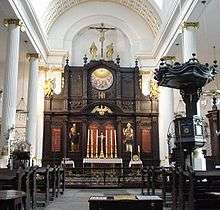Martin Travers

Martin Travers (born Howard Martin Otho Travers, in Margate, Kent on 19 February 1886 – died in London on 25 July 1948) was an English church artist and designer.
Travers was educated at Tonbridge School, entered the Royal College of Art in 1904, and took his Diploma in Architecture in 1908. At the College he studied architecture under Arthur Beresford Pite, for whom he went on to work intermittently, and stained glass under Christopher Whall. He worked for a time until 1911 as an assistant to Ninian Comper.
Martin Travers was perhaps the most influential British stained glass artist in the second quarter of the twentieth century. From 1919 until 1926 he rented a studio at Lowndes & Drury's The Glass House, Fulham. Lowndes & Drury continued to cut, fire, glaze and fix his windows after he established his own studio. Travers was awarded the Grand Prix for stained glass at the International Exposition of Modern Industrial and Decorative Arts in Paris in 1925. That same year he succeeded Christopher Whall, who died in 1924, as chief instructor in stained glass at the Royal College of Art, a position he held until his death. Travers was an original, versatile, modern interpreter of earlier artistic styles, and his windows were designed and made with a particular sensitivity to their architectural setting. Fine five-light and tracery east windows can be seen at St Andrew's, Catford - still showing the marked influence of Christopher Whall (1921), and St George's, Headstone, Harrow - in his later more refined style (1937).
Travers' name is also often connected with the Anglo-Catholic movement in the Church of England, especially that part of the movement which favoured a return to the Baroque style of church furnishing. In the 1920s he designed and constructed a number of spectacular Baroque reredos for various Anglican churches, often employing affordable materials such as plywood, whitewood, papier mache, embossed wallpaper and tinted varnished foil to achieve the desired effect, which has meant that some of this work has not weathered well. Notable examples of his furnishings in central London are the re-fashioned reredos in St Mary's, Bourne Street, Pimlico (c 1920), and the remarkable Art Deco Churrigueresque altarpiece in St Augustine's, Queen's Gate, South Kensington (1927).
As a draughtsman he is best known for his illustrations for the booklets and cards published by the Society of SS. Peter and Paul.
Travers' chief assistants were Joseph E Nuttgens (glass-painting, c 1920-1924), John E Crawford (glass-painting, sculpting, carving and decorating furnishings, some designing, 1924-1948) and Lawrence Lee (glass-painting, 1946-1948).
Sources
- Rodney Warrener; Michael Yelton (2003). Martin Travers, 1886-1948: An Appreciation. Unicorn Press. ISBN 978-0-906290-70-5.
- Michael Yelton (2016). Martin Travers: His Life and Work. Fleming H. Revell Company. ISBN 978-1-904965-52-7.